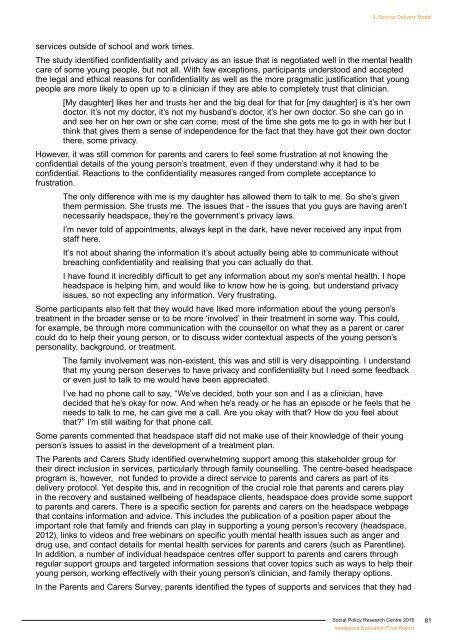Is headspace making a difference to young people’s lives?
Evaluation-of-headspace-program
Evaluation-of-headspace-program
You also want an ePaper? Increase the reach of your titles
YUMPU automatically turns print PDFs into web optimized ePapers that Google loves.
5. Service Delivery Model<br />
services outside of school and work times.<br />
The study identified confidentiality and privacy as an issue that is negotiated well in the mental health<br />
care of some <strong>young</strong> people, but not all. With few exceptions, participants unders<strong>to</strong>od and accepted<br />
the legal and ethical reasons for confidentiality as well as the more pragmatic justification that <strong>young</strong><br />
people are more likely <strong>to</strong> open up <strong>to</strong> a clinician if they are able <strong>to</strong> completely trust that clinician.<br />
[My daughter] likes her and trusts her and the big deal for that for [my daughter] is it’s her own<br />
doc<strong>to</strong>r. It’s not my doc<strong>to</strong>r, it’s not my husband’s doc<strong>to</strong>r, it’s her own doc<strong>to</strong>r. So she can go in<br />
and see her on her own or she can come, most of the time she gets me <strong>to</strong> go in with her but I<br />
think that gives them a sense of independence for the fact that they have got their own doc<strong>to</strong>r<br />
there, some privacy.<br />
However, it was still common for parents and carers <strong>to</strong> feel some frustration at not knowing the<br />
confidential details of the <strong>young</strong> person’s treatment, even if they understand why it had <strong>to</strong> be<br />
confidential. Reactions <strong>to</strong> the confidentiality measures ranged from complete acceptance <strong>to</strong><br />
frustration.<br />
The only <strong>difference</strong> with me is my daughter has allowed them <strong>to</strong> talk <strong>to</strong> me. So she’s given<br />
them permission. She trusts me. The issues that - the issues that you guys are having aren’t<br />
necessarily <strong>headspace</strong>, they’re the government’s privacy laws.<br />
I’m never <strong>to</strong>ld of appointments, always kept in the dark, have never received any input from<br />
staff here.<br />
It’s not about sharing the information it’s about actually being able <strong>to</strong> communicate without<br />
breaching confidentiality and realising that you can actually do that.<br />
I have found it incredibly difficult <strong>to</strong> get any information about my son’s mental health. I hope<br />
<strong>headspace</strong> is helping him, and would like <strong>to</strong> know how he is going, but understand privacy<br />
issues, so not expecting any information. Very frustrating.<br />
Some participants also felt that they would have liked more information about the <strong>young</strong> person’s<br />
treatment in the broader sense or <strong>to</strong> be more ‘involved’ in their treatment in some way. This could,<br />
for example, be through more communication with the counsellor on what they as a parent or carer<br />
could do <strong>to</strong> help their <strong>young</strong> person, or <strong>to</strong> discuss wider contextual aspects of the <strong>young</strong> person’s<br />
personality, background, or treatment.<br />
The family involvement was non-existent, this was and still is very disappointing. I understand<br />
that my <strong>young</strong> person deserves <strong>to</strong> have privacy and confidentiality but I need some feedback<br />
or even just <strong>to</strong> talk <strong>to</strong> me would have been appreciated.<br />
I’ve had no phone call <strong>to</strong> say, “We’ve decided, both your son and I as a clinician, have<br />
decided that he’s okay for now. And when he’s ready or he has an episode or he feels that he<br />
needs <strong>to</strong> talk <strong>to</strong> me, he can give me a call. Are you okay with that? How do you feel about<br />
that?” I’m still waiting for that phone call.<br />
Some parents commented that <strong>headspace</strong> staff did not make use of their knowledge of their <strong>young</strong><br />
person’s issues <strong>to</strong> assist in the development of a treatment plan.<br />
The Parents and Carers Study identified overwhelming support among this stakeholder group for<br />
their direct inclusion in services, particularly through family counselling. The centre-based <strong>headspace</strong><br />
program is, however, not funded <strong>to</strong> provide a direct service <strong>to</strong> parents and carers as part of its<br />
delivery pro<strong>to</strong>col. Yet despite this, and in recognition of the crucial role that parents and carers play<br />
in the recovery and sustained wellbeing of <strong>headspace</strong> clients, <strong>headspace</strong> does provide some support<br />
<strong>to</strong> parents and carers. There is a specific section for parents and carers on the <strong>headspace</strong> webpage<br />
that contains information and advice. This includes the publication of a position paper about the<br />
important role that family and friends can play in supporting a <strong>young</strong> person’s recovery (<strong>headspace</strong>,<br />
2012), links <strong>to</strong> videos and free webinars on specific youth mental health issues such as anger and<br />
drug use, and contact details for mental health services for parents and carers (such as Parentline).<br />
In addition, a number of individual <strong>headspace</strong> centres offer support <strong>to</strong> parents and carers through<br />
regular support groups and targeted information sessions that cover <strong>to</strong>pics such as ways <strong>to</strong> help their<br />
<strong>young</strong> person, working effectively with their <strong>young</strong> person’s clinician, and family therapy options.<br />
In the Parents and Carers Survey, parents identified the types of supports and services that they had<br />
Social Policy Research Centre 2015<br />
<strong>headspace</strong> Evaluation Final Report<br />
81


